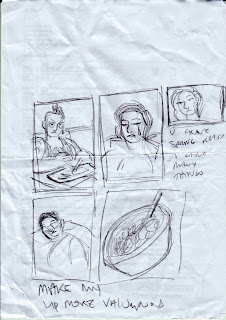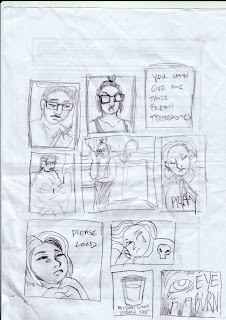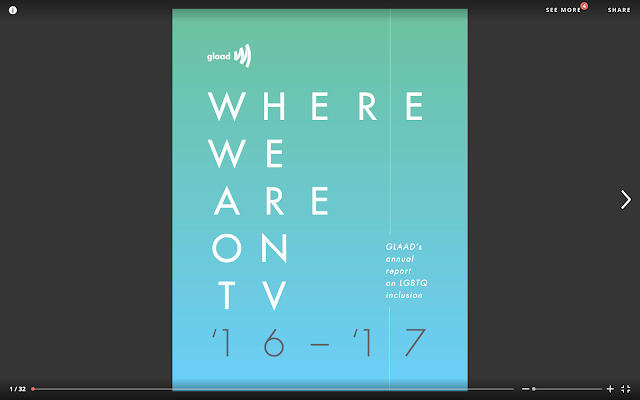I got frustrated and just started drawing friends/roommates on scrap paper. I feel this helped because it wasn't in my sketchbook, and so I didn't feel I had to draw well. All these were pretty quick! I think I can hopefully start to draw better in this project....
Wednesday, 30 November 2016
Wednesday, 23 November 2016
COP3: Queer: A Graphic History
A book I picked up at Gay's The Word, it explains a lot of queer theory with illustration, I think it's a pretty great book and a idea that can really help people starting to read into queer theory.
Tuesday, 22 November 2016
COP3: Research Trip to 'Gay's The Word' London
Had a great trip!
- Bought a few useful books! Some fiction books for myself and two books useful for COP. Queer: A Graphic History, and DIVA, a magazine for LGBT women. I'll look at these on my blog later.
- Talked to the manager! He was very nice and let me ask questions. I tried to keep it more like friendly discussion and not a formal interview, although I wish I could have recorded it some how.
- Talked about the film Pride (2014) and how the shop was the same as the one in the film. It was the headquarters of LGSM, or Lesbians and Gays Support the Miners
- Talked about attitude changes, how parents are more supportive now and buy books for their children.
- Apparently they have to ward off straight men who come in looking for lesbian porn??? But shows how men feel lesbian relationships are for them to look at and consume
- He talked about that there's not as many books for LGBT women as there is for LGBT men, which reflects sexism as a whole.
- Talked about how when Alison Bechdel published her collected volumes, it was always an event for the shop and its patrons because she was so popular. They also stocked some of the magazines her strips ran in.
- Thank you Jim McSweeny!
Included this visit in my essay as shown below:
Monday, 21 November 2016
Sunday, 20 November 2016
COP3: Polaroids
Don't know if I want to include them or not. The look of the drawings vs the photos might be too different. I'm going to try halftone them and see how I feel.
Saturday, 19 November 2016
COP3: Final Idea Session
- Short Comic depicting my COP research trip to London + Gay's the Word
- Two Colour??
- PERHAPS; look into riso printers, but also is this necessary and doable? probably not.
- 24 pages inc cover and back
- 10 comic pages
- A5
- Include Polaroids??
- Half tone for photos or draw?
- Each page is semi independent and finishes on a photograph taken in london.
- Limited panels per page!
Tuesday, 15 November 2016
COP3: I'm Fed Up with The Obsession with "Coming Out"
"We expect for people who deviate from the norm to want to be normal."
-Mads Ananda Lodahl
I am aware Fun Home is a coming out story, obviously, and coming out stories are important, but I feel coming out stories are over done. I want more LGBT stories than just coming out. Also LGBT people don't come out once, they come out constantly throughout their lives, we come out to family, friends, etc but every time we meet someone we decide weather to tell them or not. I think it also invalidates people who can't come out for saftey reasons, and have to remain in the closet.
I feel people focus more on the idea of being "free" than the idea of why we feel the need to be "in the closet" in the first place.
COP3: Gay's the Word Questions
Going to contact the bookshop and ask if I can speak to for a quick 10-15 chat. I don't want to inconvenience them so I need to keep my questions short and precise and easy for them to give answers to.
Do you think comics are a good medium for LGBT people to tell LGBT stories? If so why.
Do you think making LGBT comics is a good way for people to deal with being born into, growing up in and living in a heteronormative* society?
Do you have anything to say about the future of LGBT comics?
I'm going to keep it natuaral conversation overall, but here's the kind of things I want to answer. I'm open to where ever the conversation takes it.
Monday, 14 November 2016
COP3: Bookstore Interview
The interview covers more about the history of the store, but still very interesting and talks about how attitudes have changed over time, how the shop was the basis for the bookshop in the Pride movie, how
Started pre-internet so it was the only source of LGBT books other than mail ordering. One of around 5 others in the UK, but the only one left standing.
Feels it's good news that mainstream bookshops stock LGBT books, gives us validation, however these sections can just become just erotic texts, hidden under the stairs, or become smaller and smaller sections and isn't really consistent branch to branch, some have good sections and some don't.
Always aiming to keep lots of academic texts in the shop as well as political texts, not just erotic books, but also wants to keep a wide range for people to choose from.
Shows the newsletters the shop published, how people thought they just stocked porn.
Big range of customers, people come from all over the world, has a lot of meet ups. Happy to offer meeting space. Is a community space now. Loves to see parents coming in with or for their child.
Constantly inspired by the people who come in. Loves hearing people's stories who come into the bookshop.
The future new generations discovering the bookshop is always heartwarming, wonder that the rise of ereaders/ebooks if there a reason to continue, but thinks personal engagement and the heart of the bookshop make it special. A safe space.
COP3: DO-OVER: 5 BOOKS I WISH I’D HAD WHEN I CAME OUT
An article from a lesbian journalist about books she wish she'd had to read as a young teen. She takes books she did read and offers alternatives to them, usually happier and more uplifting.
A very interesting thing I feel is that a lot of heavier texts have been replaced with comic recommendations. I think this but also perhaps literature has a tendency to be more bleak and realistic? The comics recommended are much more upbeat than the ones she is replacing, perhaps because modern comics are more fantastical and humorous and thus would give a young lesbian girl a brighter outlook on life or a brighter escape from a possibly bleaker real life?
Article Here
Article Here
Saturday, 12 November 2016
COP3: Difficulty Drawing the Self
I've tried to draw myself a few times and I always found it difficult. I feel it's an issue of self esteem and also not wanting to be judged for how you're drawing yourself. I've seen many artists approach the topic of drawing themselves in different ways. Alison Bechdel's drawings of her self are pretty accurate, but some artists intentionally draw themselves completely differently from what they actually look like.
Perhaps this is a way of protecting themselves since by doing this they don't have to expose themselves to whoever reads their comic. Maybe they draw themselves that way because they're drawing themselves in a way which shows who they are as a person rather than their outside appearance.
Some take this one step further and go come rely abstract, drawing themselves as animals, objects, etc
I feel abstract would not work for me personally, but I do need to find a way to tackle these insecurities and make visual depictions of myself.
Friday, 11 November 2016
COP3: Boy, It's Still Something
I think this day and age you'd be forgiven for thinking talking LGBT people being visible is not radical anymore or that LGBT issues is over, especially in the western world. You hear these sentiments a lot, especially things like "You can get married now, what's the big deal!" and other things that imply that being LGBT isn't a problem anymore.
However with the election of (Klansman) Donald Trump and his anti-LGBT policies, his vice president will be Pence, a man who believes the american state should fund electroshock "therapy" (usually physical and psychological torture which ends in most candidates committing suicide) to "cure" LGBT people.
Even taking that massive sign aside, LGBT teens still get kicked out and become homeless, adoption still favours straight couples, people still remain closeted, TV and media does not accurately represent us and still uses harmful tropes, alcoholism and drug use are a mass community problem, LGBT hate crimes still happen, trans issues are no where near resolved and I still feel nervous telling people my sexuality and feel anxiety holding my girlfriend's hand in public. And this is only in the UK. We live in a more "progressive" country (even though many of our own government officials still carry homophobic views) and there are so many places around the world where people still fear death for being discovered.
Throughout this project and in past context of practice modules I've never wanted to be "that person" who speaks too loudly about LGBT issues, that person who is AGAIN annoyingly talking about LGBT stuff (especially to LGBT classmates who arent really deep into looking at queer theory and never want to be,) It makes me self conscious when talking about my project, but really by doing this project and about heteronormativity I've realised that being self conscious about my project is a product of heteronormativity itself. Our heteronormative society deems my sexuality and my subject tabo/abnormal, and thus I feel I should be modest and half hide it.
Knowing that doesn't make it easier, but it is very interesting to think about.
Alison Bechdel commented that when she got out of college, she was disappointed that she'd missed the big LGBT social movements, and that there was nothing left to do, yet looking back at the time she lived in, there was still so much left to do, and eventually she found her form of activism and her place, making comics about the inner lives of lesbian women as a way of getting people to love and accept them "If they saw us, how could they help but love us!"
There is still a long long way to go, but LGBT have always created art despite the world climate, perhaps now is a good time to be obnoxious and make LGBT work and maybe some day people will look back at us and our work and realise we really did still have a lot to do and see what we did to try change that.
COP3: 'Gay's The Word' Bookshop
Established in 1979, Gay's The Word is the UK's pioneering first (and is today the last surviving) lesbian and gay bookshop. Was also featured in the movie 'Pride!'
I'm going to London soon, so will have a look around and see if I can find any useful books/talk to staff. They seem to be very friendly and stock a lot of stuff. Will mostly try looking for comics, books about lesbian art, autobio comics, etc.
Possible questions to ask staff?
-Why do you think places like this are valuable to LGBT people?
-What do you think makes LGBT people publishing work special?
-What do you think of LGBT comics?
Tuesday, 8 November 2016
COP3: GLAAD "Where Are We On TV" 2016-2017
And you know what that means! Time to name and shame all the terrible representation of LGBT people in TV programing (or therefore lack of it).
GLAAD's report is pretty good, it goes through all the different types of network, streaming, etc, then through gender, race (which is then has spreads for each race after), disability, then a look at bisexial and "bi+" characters specifically etc. It's a very detailed report but isn't so detailed it becomes bogged down and boring.
Obviously this is only USA centric but I feel because we consume so much american media and that america is a media powerhouse it's very important to look at.
I mostly focused on LGBT women due to my dissertation and own personal interests but reading the report but it is all very interesting. (For example needing more trans men characters.)
A thing GLAAD brings up themselves is that the numbers for lesbian and bisexual women aren't reflective completely. 25+ lesbian and bisexual women characters have been killed in their respective shows this year. On broadcast networks over half of all lesbian characters have been killed. (and that doesn't even count the deaths of LGBT women in cable or streaming). In the introduction, GLAAD's CEO Sarah Kate Ellis calls it a "toxic" trend and point out that these deaths were mostly used as a plot device to further narrative for straight, cisgender characters. She calls for LGBT people to have their own stories and not just be stepping stones for cisgender, straight characters. A lot of these characters that died are included in the graphs, so really next year (unless a lot of LGBT women are added which I find unlikely) we'll see a severe drop in the segments representing LGBT women.
The general trend of having more men than women on TV continues here too. (With the exception of trans men) I feel the gender imbalance of having more LGBT women on the streaming services is probably down to Orange is the New Black, which has a lot of LGBT women, and if that show was taken out of counting the gender imbalance of having more LGBT men would remain the same as it does for broadcast and cable.
Not sure I can use these things in my dissertation but it's very relevant and also a personal interest so I thought I might as well blog it anyway.
GLAAD's report is pretty good, it goes through all the different types of network, streaming, etc, then through gender, race (which is then has spreads for each race after), disability, then a look at bisexial and "bi+" characters specifically etc. It's a very detailed report but isn't so detailed it becomes bogged down and boring.
Obviously this is only USA centric but I feel because we consume so much american media and that america is a media powerhouse it's very important to look at.
I mostly focused on LGBT women due to my dissertation and own personal interests but reading the report but it is all very interesting. (For example needing more trans men characters.)
A thing GLAAD brings up themselves is that the numbers for lesbian and bisexual women aren't reflective completely. 25+ lesbian and bisexual women characters have been killed in their respective shows this year. On broadcast networks over half of all lesbian characters have been killed. (and that doesn't even count the deaths of LGBT women in cable or streaming). In the introduction, GLAAD's CEO Sarah Kate Ellis calls it a "toxic" trend and point out that these deaths were mostly used as a plot device to further narrative for straight, cisgender characters. She calls for LGBT people to have their own stories and not just be stepping stones for cisgender, straight characters. A lot of these characters that died are included in the graphs, so really next year (unless a lot of LGBT women are added which I find unlikely) we'll see a severe drop in the segments representing LGBT women.
The general trend of having more men than women on TV continues here too. (With the exception of trans men) I feel the gender imbalance of having more LGBT women on the streaming services is probably down to Orange is the New Black, which has a lot of LGBT women, and if that show was taken out of counting the gender imbalance of having more LGBT men would remain the same as it does for broadcast and cable.
Not sure I can use these things in my dissertation but it's very relevant and also a personal interest so I thought I might as well blog it anyway.
Saturday, 5 November 2016
Thursday, 3 November 2016
COP3: Queers & Comics Keynote: Alison Bechdel
Notes:
-She feels a bit like she's at a family gathering but with distant relatives she actually likes.
-Respect elders of LGBT comics and hopeful for the new artists. Liked how the conference was a mesh of the both together, people of all ages united under LGBT comics.
-Using a pseudonym would have defeated the
purpose
-Tries not to think about legacy because its
overwhelming but is honored but also a big responsibility
-In the beginning she defined herself as a lesbian cartoonist, but now wonders if she's more of a cartoonist who is a lesbian. She's wrestling with that a bit.
A great panel I screencapped.
I took away from this video the great sense of community LGBT comics can create. Also the idea of trying to wrestle with your minority status defining you and letting it go a little but without hiding or denying a part of yourself that colours who you are as a person.
Subscribe to:
Comments (Atom)



























